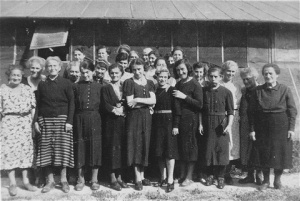Tags
anti-Semitism, collaborators, France, Holocaust, Jews, rescue, Vichy
Review: Village of Secrets: Defying the Nazis in Vichy France, by Caroline Moorehead
HarperCollins, 2014. 374 pp. $28
This is an important, necessary work of history that reads like a novel, a tale of courage, altruism, deceit, and murder whose echoes resound more than seventy years after the fact. In telling how a cluster of French villages resisted German occupation during World War II, Village of Secrets also grasps the larger context of a humiliated, divided nation largely silent in the face of outrageous crimes.
Moorehead describes the extent to which the French police, the Vichy government, and private citizens went out of their way to catch, kill, or deport Jews, their zeal astonishing the Germans, who had, often, not even ordered these measures. As a historian who has researched Occupied France, I’ve never seen so concise and readable an account of these events.

Prisoners at Gurs detention camp, from which many thousands were deported. Gurs, France, ca. April 1941. Courtesy U.S. Holocaust Museum, Washington, D.C.
Most of the narrative, however, concerns an extraordinary effort to protect hundreds of Jews, usually (but not always) children whose parents had already been sent to Auschwitz, and a smaller number of resisters, Freemasons, and Communist veterans of the Spanish Civil War. Incredibly, the rescuers did more than that, often extracting these people from holding camps that supplied the cargo for deportation trains. Some rescuers were Jewish social workers using false papers; many others were their Christian counterparts. In both cases, they funneled refugees to a remote plateau in the southern Massif Central, a largely Protestant enclave, where pastors and educators helped disperse them to farms and school dormitories. There, they assumed new identities, safeguarded, remarkably, by the villagers’ silence.
The main village, Le Chambon-sur-Lignon, has been honored by Yad Vashem in Jerusalem as Righteous Among the Nations, an extremely rare honor, and is celebrated within France. To her credit, however, Moorehead looks past these accolades; she has no interest in moral uplift or easy judgments. From her detailed account, based heavily on interviews with survivors, both rescuers and victims come across as complex, flawed people. She sifts conflicting evidence to decide when appearances deceive or the principals lied, whether to others or themselves. My favorite parts were her accounts of how the rescued Jews coped (or didn’t), and how their hosts treated them. In all the Holocaust literature I know, I’ve never read anything like it.
That said, I wish that Moorehead had taken greater care with a few details. Her research was exhaustive, but her footnotes are sketchy, which makes it harder to use her sources or even know what they are in a given context. It also compromises her devotion to truth-telling–not that I have any reason to dispute what she says, but that she fails to nail it down. For instance, the role of Pierre Laval, Vichy’s chief politician, remains controversial in some quarters, as does his execution for treason after the war. From what I’ve read, he deserved it, but solid evidence is always useful, and though Moorehead quotes at least two damaging statements, she provides no source.
I’d have also liked discussion of how the Jews being sheltered felt about their religion. I gather that few continued to practice, likely for security reasons, if no other. But surely they had feelings about abandoning their faith, and, for the children, whether that meant they had separated themselves still further from the parents they had lost.
Nevertheless, I don’t mean to detract from Village of Secrets, a terrific book and a worthy addition to the ever-growing body of work on the Holocaust.
Disclaimer: I obtained my reading copy of this book from the public library.
